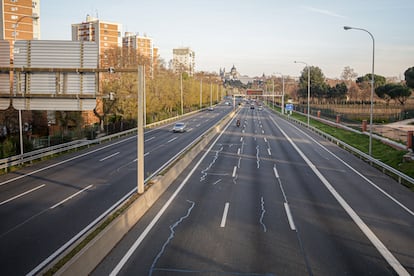“No time to lose” with state of alarm, say biology experts
Professors from Madrid’s Complutense University support the government’s emergency measures, which will be put in place today by the Cabinet

The Spanish Cabinet will today implement the most drastic measures taken so far in a bid to halt the spread of the coronavirus, by putting in place a state of alarm that will give the central government more powers. Over the next two weeks, the government of Prime Minister Pedro Sánchez will be able to limit the circulation of citizens, take control of businesses or premises – including hotels, in a bid to ease the burden of hospitals – and give orders to guarantee supply to the markets.
Jesús Pla and José M. Bautista, professors in microbiology and molecular biology, respectively, at Madrid’s Complutense University, explain that the scientific community supports the declaration of the state of alarm. “There is no time to lose,” they say.
There could be a lot of collateral deaths due to other illnesses that can’t be dealt with in time
Article 116 of the Spanish Constitution describes three legal categories for emergency situations: state of alarm, state of emergency and state of siege (in Spanish: estado de alarma, estado de excepción and estado de sitio). It is the first and lowest level of these situations that will be put into force today.
Pla and Bautista explain that if the health system were to become overwhelmed due to the high transmission rate of a virus where there is no treatment or vaccination, as is the case right now for the SARS-CoV-2 coronavirus, “there could be a lot of collateral deaths due to other illnesses that can’t be dealt with in time,” they say.
Declaring the state of alarm was urgent, they add. “Right now, the number of existing cases is a reflection of the infections that have taken place unnoticed between one and two weeks ago,” the experts say. “The almost exponential growth suggests that within a week it could be very late to take effective exceptional measures.” The professors say that every day that the country sees without these measures, it will be “in a worse position to contain the disease and the spread of the virus.”
According to Article 116 of the Spanish Constitution, the executive will have to inform the speaker of the lower house of parliament, the Congress of Deputies, of the content of the decree that will be approved by the Cabinet today, who will in turn pass the information on to the relevant parliamentary commissions. All measures taken by the government during this two-week period will similarly be communicated to Congress. Should the government want to extend the state of alarm, Congress will have to approve such a measure.
English version by Simon Hunter.
Tu suscripción se está usando en otro dispositivo
¿Quieres añadir otro usuario a tu suscripción?
Si continúas leyendo en este dispositivo, no se podrá leer en el otro.
FlechaTu suscripción se está usando en otro dispositivo y solo puedes acceder a EL PAÍS desde un dispositivo a la vez.
Si quieres compartir tu cuenta, cambia tu suscripción a la modalidad Premium, así podrás añadir otro usuario. Cada uno accederá con su propia cuenta de email, lo que os permitirá personalizar vuestra experiencia en EL PAÍS.
¿Tienes una suscripción de empresa? Accede aquí para contratar más cuentas.
En el caso de no saber quién está usando tu cuenta, te recomendamos cambiar tu contraseña aquí.
Si decides continuar compartiendo tu cuenta, este mensaje se mostrará en tu dispositivo y en el de la otra persona que está usando tu cuenta de forma indefinida, afectando a tu experiencia de lectura. Puedes consultar aquí los términos y condiciones de la suscripción digital.








































